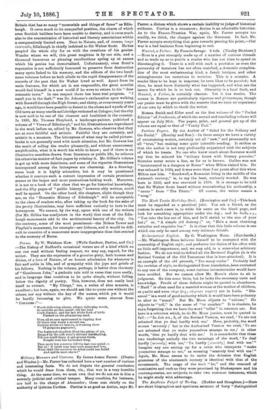Poems. By W. Walsh= How. (Wells Gardner, Darton, and Co.)
—The Bishop of Bedford's occasional verses are of a kind which no one can read without feeling respect, we may say, regard, for the writer. They are the expression of a genuine piety, both human and divine, of a love of Nature, of an honest admiration for whatever is fair and noble in life, and of sympathy with the joys and griefs of his fellows. Nothing in the volume, perhaps, is better than the story of "Gentleman John," a pathetic tale told in verse that runs easily, and in language that contrives to be quite simple, without falling below the dignity of poetry. This, however, does not easily lend itself to extract. "My Clergy," too, a series of nine sonnets, is excellent ; but here, again, we should not like to quote one without the others, nor any without the key of the names, which yet it would be hardly becoming to give. We quote some stanzas from "Converse :"— .. Words following enema, silence following words, So sped the go'den sunset, till the land
Grew dimmer, and the last white flock of birds Flashed on the glimmering sand.
Then all at once upstreamed in rippling flow Of silent rosy waves a second sea, Surging across all heaven, a trancing show Of gorgeous pageantry, The feathered clondlets filled the plains of air, Banged by the soft wind's delicate marshalling, Till you could fancy Ai.gel armies there, Nought seen bat burnished wing.
Then more low converse till the last rose paled :— But oh ! if earth may bear such peace and love. What shall the converse be when earth has failed And spirits meet above!"
















































 Previous page
Previous page